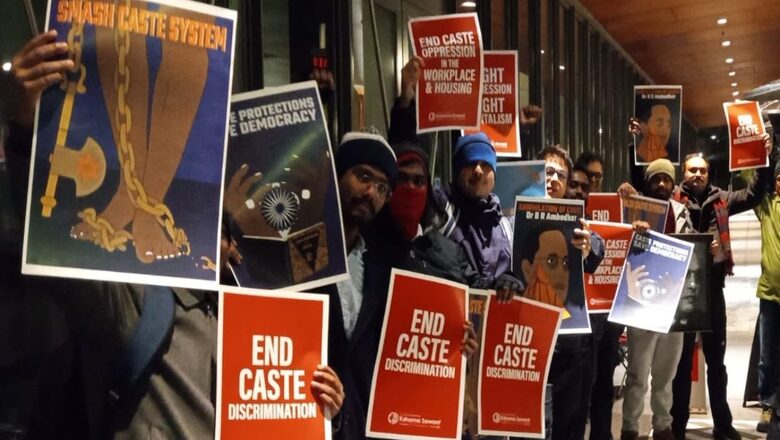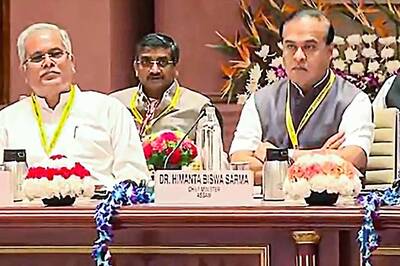
views
An unlikely caste war is raging across the United States. Ordinary Americans know nothing about it, and even Indian Americans are mostly ignorant of the forces arrayed against them. In this war, human rights activists have joined forces with Muslim and Sikh organisations to vilify India in general and Hindus in particular. They are succeeding in convincing ordinary Americans that Indian immigrants have brought caste-based discrimination to the United States.
Hindus who are active in temple governance may have heard about the labour rights case that was brought against the B.A.P.S. Mandir in Robbinsville, New Jersey. Tech executives in Silicon Valley may have heard of the caste discrimination case that was brought against Cisco Systems. And others may have heard when Seattle became the first city in America to outlaw caste-based discrimination.
But few people are aware that these battles are all connected fronts in a larger war that also includes efforts to stigmatise Hindus on American university campuses, promote Dalit rights narratives at Google, embed anti-Hindu propaganda in American school textbooks, and convince Californians that the Hindu faith is fundamentally based on caste repression.
At the centre of all of these controversies is the allegation that anti-Dalit discrimination is a fundamental characteristic of the Hindu faith. Muslim and Sikh organisations have taken up the cause of Dalit rights in order to disparage American Hindus, the Hindu faith, and ultimately the entire country of India in the eyes of ordinary Americans and the American media. And despite some recent legal reverses, the Muslim-Sikh-Dalit coalition is winning the larger narrative war.
Everywhere in this diaspora culture war, you will find an American Dalit rights organisation called Equality Labs. Supported by its allies in the Indian American Muslim Council and the Sikh Coalition, Equality Labs promotes the idea that American Dalits face serious caste-based discrimination in the United States.
They routinely cite a 2016 United Nations Human Rights Council claim that “250 million people worldwide still face appalling and dehumanising discrimination based on caste”—a claim that is sourced to a defunct website that also provided no documentation. And they cite a 2016 survey of Dalit rights activists conducted by Equality Labs itself.
No fewer than two-thirds of the Dalits who responded to the Equality Labs survey reported facing caste-based discrimination in their American workplaces. That sounds awful until you read the details. The survey wasn’t conducted on a broad-based sample of American Dalits. It was conducted on a self-selected sample of American Dalit rights activists.
The suggestion that two-thirds of American Dalits face caste-based discrimination in their workplaces is nonsensical. Few American Dalits are likely to have bosses who have any knowledge of caste whatsoever, or even know what a Dalit is. Certainly, some American Dalits may work in organizations alongside other Indian Americans. But there just aren’t that many Dalits—or Indians—in America.
In India, roughly one-quarter of all people identify as members of Scheduled Castes and Scheduled Tribes. But America has no schedules. The best estimate that can be made, based on data from a 2020 survey conducted by YouGov for the Carnegie Endowment for International Peace, is that only 20,000 to 25,000 Americans identify as “Dalit” or as members of castes that are scheduled in India.
That is a tiny fraction of the Indian-American population of more than 4 million, and an even tinier fraction of the population of the United States as a whole. In short, there are very few American Dalits, and there is no solid evidence that they face discrimination in the United States. According to Equality Labs’ own survey, 80 per cent of American Dalits hold or are studying for postgraduate qualifications. Whatever the true data, it is clear that Dalits are not a historically disadvantaged group in the United States.
So why are American Muslim and Sikh civil society organizations so concerned about potential anti-Dalit discrimination in the United States? The Indian-American diaspora culture war seems to be driven by two forces: hatred of India, and hatred of Hindus. Both of these forces coalesce in Islamist and Khalistani movements in the United States.
The organisations that have joined together to fight caste-based discrimination in America are generally aligned with demands for independence for Kashmir and Khalistan. Many of them host “free Kashmir” and “free Khalistan” materials on their websites alongside their Dalit rights campaigns. Fighting caste discrimination is, for them, merely a tactic in a wider war.
The Muslim-Sikh-Dalit coalition may not succeed in its ultimate geopolitical goals, but it is succeeding in turning American public opinion against Hindus—and against India. This is something that should concern all Hindus—and all Indians.
The most effective way to combat American anti-Hinduism might be for Muslim and Sikh Indians to speak up on behalf of their Hindu compatriots. The diaspora caste war is a war that Indians can win, but only if they stand together against those who would divide them along religious and communal lines.
Salvatore Babones is an associate professor at the University of Sydney. His new report, ‘The Weaponization of Caste in America’, has just been published by the Indian Century Roundtable. Views expressed in the above piece are personal and solely that of the author. They do not necessarily reflect News18’s views.



















Comments
0 comment